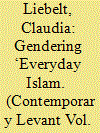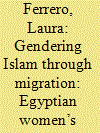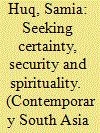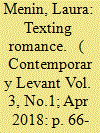|
|
|
Sort Order |
|
|
|
Items / Page
|
|
|
|
|
|
|
| Srl | Item |
| 1 |
ID:
160374


|
|
|
|
|
| Summary/Abstract |
In this introductory paper, we contribute to the important debate on 'Everyday Islam' by thinking about ways in which the everyday constitutes a useful analytical category in relation to Islam, not in contrast to studies of Islamic piety and normativity, but as co-constituted with (Islamic) morality. Secondly, drawing on a feminist critique in anthropology that is intricately linked to the discussion of the everyday in the wider Mediterranean, we seek to insert 'gender' as an analytical category into the debate on everyday Islam and quotidian life in the region, focusing on norms of femininity and the particular experiences of women. The focus on women, we argue, is especially suited to analyse the gendered dynamics in Muslim-majority societies and indeed an almost revolutionary process within Islam in recent years, namely that of women becoming knowledgeable, self-reflective and 'literate' in reference to the hermeneutics and rhetorics of Islamic texts.
|
|
|
|
|
|
|
|
|
|
|
|
|
|
|
|
| 2 |
ID:
160376


|
|
|
|
|
| Summary/Abstract |
Italy is the first European arrival country for many Egyptian migrants. A first wave of Egyptian male migrants in Italy was followed by a family reunification phase, with the result that the number of Egyptian women increased in the last decades. Studies of their diasporic experience, nonetheless, are still rare. In particular, analysis of women’s relationship with Islam is needed. Building on the anthropological work which has recently showed how the everyday constitutes a useful analytical category in relation to Islam, the aim of this article is to describe and analyse women’s activities in a mosque in Turin during the years 2011–13. I argue that the role of religious spaces in the context of emigration goes beyond the religious sphere, and women’s participation should therefore be understood from a dual perspective: religious and spiritual, on the one hand, and social and cultural, on the other. The description of women’s everyday practices in religious space allows for a reflection on how migration shapes new Islamic identities that are co-constituted with morality, secularism and displacement. The article contributes to the debate on ‘everyday Islam’ by showing that the effects of migration on the religious experience, far from being homogeneous, can encompass both normativity and resistance.
|
|
|
|
|
|
|
|
|
|
|
|
|
|
|
|
| 3 |
ID:
180274


|
|
|
|
|
| Summary/Abstract |
Bangladesh has made significant strides on women’s issues in the areas of education, employment and politics. In the wake of this progress, the country has also experienced a surge of religious ideas leading to secular anxiety that cultural Islamization is leaving very tangible marks on the bodies and lives of women. The proliferation of the hijab along with an appropriation of other religio-cultural elements into everyday life is considered to be an example of the force of Islamization that many fear to be conducive to radicalization. In this paper, I probe the role of religion in the lives of female university students in an attempt to assess what it means for them to be young, to have aspirations, to navigate different and often opposing expectations, and to assert their agency as they stand on the cusp of adulthood. In teasing out the influences that give their lives’ navigations religious sanctions and/or approvals, I trace the place of inclusivity, pluralism and tolerance in the lives of young, educated women in Bangladesh.
|
|
|
|
|
|
|
|
|
|
|
|
|
|
|
|
| 4 |
ID:
160380


|
|
|
|
|
| Summary/Abstract |
Over the last decade, the mobile phone has become an integral part of a subterranean ‘youth culture’ of romance in urban Central Morocco. By expanding the opportunities of male–female interaction, the mobile phone enables young women to explore the possibilities of emotional and physical intimacy beyond conventional rules of courtship. The desire for premarital romance, though, collides and interweaves with conventional gendered practices and moralities, as well as with the new religious sensibilities that have emerged with the Islamic revival. Tracing the ways Zahra and Yasmin, two unmarried women in their early 20s, mediate dynamics of flirting, seduction and jealousy via the mobile phone, the author shows how they affirm their respectability through and not in spite of their intimate mediated practices. Far from being only a powerful ‘mediator’ between intimate desires, social expectations and public morality, the mobile phone reveals itself as integral to the ways Zahra and Yasmin reflect on, and act in, their intimate and moral worlds. The author hopes to contribute to ‘gendering’ anthropological debates on ‘everyday Islam’ by showing the nuanced ways in which young women in Central Morocco use the mobile phone to shape their intimate lives, navigating competing femininities and gendered moralities.
|
|
|
|
|
|
|
|
|
|
|
|
|
|
|
|
| 5 |
ID:
160378


|
|
|
|
|
| Summary/Abstract |
This article analyses how second-generation Moroccan women are integrating new ways of understanding Islam and morality into their everyday. The study is based on ethnographic research and on the life stories of young Moroccan women who attend Spanish universities. The author explores the concerns that these students share in a context in which being a Muslim woman can lead to situations of inequality and discrimination within their own intragroup, namely their families and members of the Moroccan community, as well as the non-Muslim members of Spanish society. The study reveals how the participation of these women in higher education promotes the appropriation of a discourse related to Islamic feminism. As a result of this appropriation they are able to negotiate new interpretations of religious practice and meanings of moral norms, which they integrate into their everyday world. From this perspective the study reveals the way that these young women try to construct a more inclusive identity as Muslim women living in Spain.
|
|
|
|
|
|
|
|
|
|
|
|
|
|
|
|
|
|
|
|
|